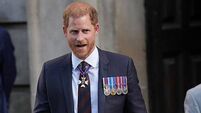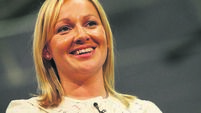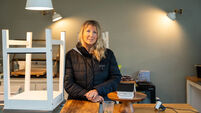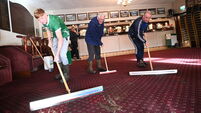Thomas Barnardo changed the way we think about children
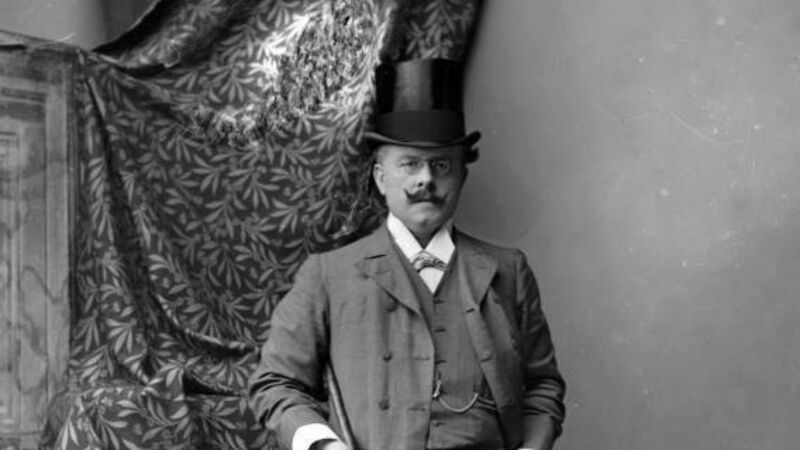
In Barnardos, we had spent the entire day encountering the generosity of Irish people as we shook buckets all over the country for our work. And then in the evening we decided to make our own little contribution to Culture Night, by putting on a performance in Barnardo Square.
Barnardos Square is in the middle of Dame Street. The City Council agreed to call it that because Thomas Barnardo was born there in 1845, when it was a row of houses and shops. The Culture Night organisers had a troupe of amazing drummers in the square, and we followed that by asking Dublin’s favourite historian Pat Liddy to tell the crowd about some of the history of the locality. We had a brilliant young dance troupe from Tallaght, and yours truly decided to dress up as Thomas Barnardo and talk for a while about his life and work.
I’m sure I looked a sight, in my top hat and Victorian frock coat. But I was keen to do it, because so little is known in Ireland about Thomas Barnardo. In fact, when I started working for the organisation nearly ten years ago, I had assumed he was an Englishman. I knew that he was widely regarded as one of the best known philanthropists of his era, but not an awful lot more than that.
But we can claim him as one of our own, a great and distinguished Irishman. He was born right in the middle of Dame Street, and started his education in a national school (which no longer exists) round the corner in Fishamble Street (whose main claim to fame is that it was the first place where Handel’s Messiah was performed).
Barnardo was sent as a young boy to the St Patrick’s Cathedral Choir School, and it was there he had the first defining experience of his life. The principal of the school was a reverend William Dundas – in later years Barnardo was to write of him that he was the most cruel man he had ever seen. “He seemed to take a savage delight in beating his boys.” The behaviour of Dundas gave Thomas Barnardo a life-long hatred of violence against children.
Barnardo had deep religious conversion in his late teens and decided to become a doctor and a missionary in China. With little income, he took lodgings in the east end of London to begin his medical studies. (He actually never fully qualified as a doctor, even though he like to be referred to as Doctor Barnardo.)
As a lay preacher, he saw it as his mission to preach against the evils of alcohol, and spent night after night being jeered and mocked, and occasionally beaten up, in the gin palaces of the east end. But he also became aware of the deep poverty in which thousands, and especially children, lived.
The second defining experience was one night in the late 1860s when he met a young boy called Jim Jarvis, the most destitute child he had ever met. The boy was in rags, with no family and no home. At Barnardo’s urging, he showed him where hundreds of other boys were sleeping, on the rooftops because that was the only place they could get heat.
That was the inspiration for the first of Barnardos homes for destitute boys, which he opened with the help of some friends in Stepney. As soon as it was opened it was full, and it wasn’t long before another destitute boy, John Somers, was turned away because every bed was full.
Somers was found, frozen to death in a vegetable barrel, a couple of nights later. The incident devastated Barnardo, and from that moment on there was a sign over his premises that read “No Destitute Child Turned Away”.
Barnardos was a difficult man. Complex and charismatic, he could be a bully, a chancer, sometimes even a bigot. He was forever involved in battles and controversies. But over the course of his life he rescued thousands of children from poverty and neglect, and built an organisation that has the highest standards in the world today.
There are four charities in the world named after him, in Britain, Australia, New Zealand and Ireland. They’re all now totally independent, and each has its own sense of mission and purpose. None of the charities now run residential centres because of a core belief that the best way to solve family problems is within the family. But all owe a lot to his determination and commitment to children.
When I was researching him for the talk I gave on Culture Night, I discovered one other thing about him that I’d never known. Barnardo and his wife Syrie had seven children, a number of who died young. One who survived was his daughter Marjorie, who was born with Down Syndrome.
She too was one of the defining relationships in his life. Up to that time the commonest approach to children with intellectual disabilities was abandonment and institutionalisation. Barnardos fought against this all his life, and was one of the first people ever to argue for the rights of people with a disability.
He provided education and training to all the children in his care, and gave them a better chance at life. By the time he died he had built dozens of homes, a hospital for sick children, and a village for girls. The total number of children cared for by his organisation in his lifetime was just under 60,000 – at the time of his death nearly a quarter of the children in their care had disabilities.
He more or less invented the concept of foster care – boarding out, it was called at the time. He raised millions, and spent millions more – at the time of his death the charity was in debt to the tune of a quarter of a million pounds.
Barnardo grew up in the world of the Poor Law and the workhouse, where a distinction was made between the “deserving” poor and the “undeserving” poor. It was another distinction he refused to recognise, and through his work he changed the way we think about it.
Especially, he changed the way we think about children. In everything he did, and as difficult as he could be, he insisted that every child, whatever circumstances they came from, had a right to care, to education, and to the best possible start in life.
There aren’t all that many Irish people that we can genuinely say left here, and went on to change the world. Thomas Barnardo, born in the centre of Dublin when the rest of the country was being ravaged by famine, was one of that handful. His place in English history, as one of the great Victorians, is secure. Personally, I think it’s time we claimed him back.

